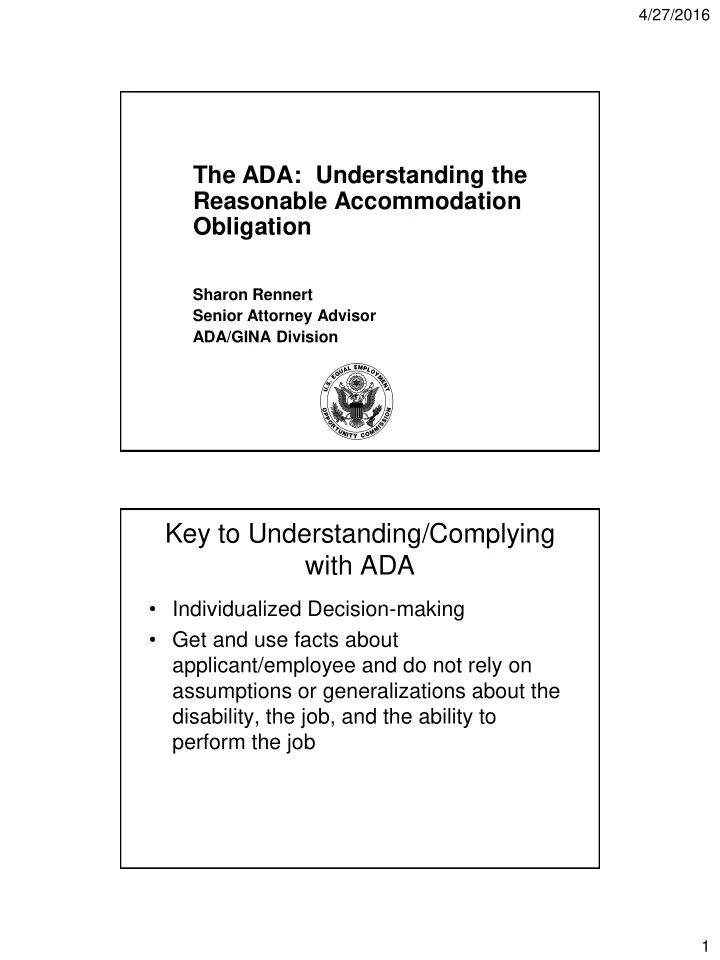

4/27/2016 The ADA: Understanding the Reasonable Accommodation Obligation Sharon Rennert Senior Attorney Advisor ADA/GINA Division Key to Understanding/Complying with ADA • Individualized Decision-making • Get and use facts about applicant/employee and do not rely on assumptions or generalizations about the disability, the job, and the ability to perform the job 1
4/27/2016 Reasonable accommodation • Defined: – A reasonable accommodation is a change in the workplace, or in the ways things are usually done, that provides equal employment opportunities for individuals with disabilities – General rule: An employer provides a reasonable accommodation to a qualified individual with a disability if requested and if doing so does not pose an undue hardship 3 Areas Where Employers May Have To Provide Reasonable Accommodations • Application Process • Accommodations that enable an employee to perform her job or to gain access to the workplace (includes, e.g., bathrooms, cafeterias) • Benefits and Privileges of Employment – Mandatory or voluntary training/staff meetings – Employer-sponsored parties: Even if off-site and outside business hours – Employer-sponsored programs/special events 2
4/27/2016 Interactive Process !!!!!!!! • Process usually starts with a request from an applicant/employee – No “magic words” needed – Individual must tell employer that she needs something from the employer because of her medical condition – Need not be in writing – May come from someone other than the individual needing the accommodation (doctor’s note) – Employer may obtain information to determine if the individual’s medical condition constitutes a disability and/or to verify the need for accommodation – Cooperative Process! Reasonable accommodation • Almost unlimited possibilities • May include: – Sign language interpreters – Modifications to existing equipment or purchase/lease of new equipment that is accessible to individual with a disability – Modifying workplace policies – Changes in the working environment (e.g., flashing warning lights for evacuations) – Reassignment (last resort) 3
4/27/2016 Reasonable accommodation • Actions not required: – Removing an essential function (i.e., fundamental/critical job duty) – Lowering production standards (quantitative and qualitative) – Excusing misconduct/performance deficiencies – Providing personal use items, such as hearing aids, service animals Employees Entitled to Effective Accommodation • Employer must provide an accommodation that meets the employee’s needs and removes a workplace barrier • But, employee is NOT entitled to accommodation of her choice • If 2 or more accommodations would be effective, employer may choose between them – This means you can make counter-offers! – Listen with open mind to any objections (individual may be right that your suggestion has problems). – If possible to provide the accommodation that was requested, that may be best in many situations. • Critical that employer understand exact nature of problem to determine all possible, effective accommodations, then assess whether any/all possibilities constitute “undue hardship” 4
4/27/2016 Consider Testing A Possible Accommodation During a Trial Period • Good option where employer (or employee) has doubts/concerns whether a proposed accommodation will work as proposed • Do not use a trial period where clear an accommodation will or will not work (for example, do not need to test whether a sign language interpreter works) • Accommodations where a trial period may be helpful: telework, modifying work schedules • Generally, a trial period should last 1 to 6 weeks – Long enough to really test whether accommodation works or not – May need to tweak the accommodation, rather than revoking it, if minor issues/problems arise – If clear that accommodation not working, may cut short a trial period Undue Hardship – Significant difficulty or expense – Focus here is on resources and circumstances of agency as a whole, including impact on operations – Undue hardship refers to denial of a specific accommodation – Consider financial difficulty as well as reasonable accommodations that are extensive, substantial, or disruptive 5
4/27/2016 Sharon Rennert 202-663-4676; Sharon.Rennert@eeoc.gov EEOC Enforcement Guidance on Reasonable and Accommodation and Undue Hardship www.eeoc.gov/policy/docs/accommodation. html 6
Recommend
More recommend